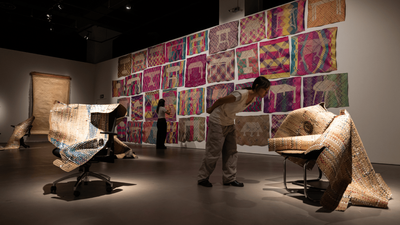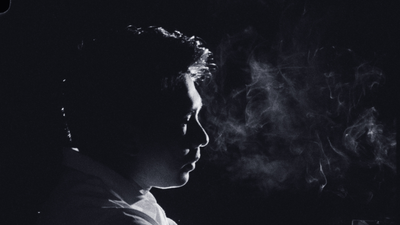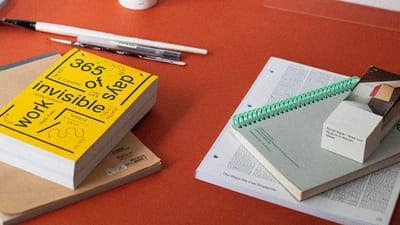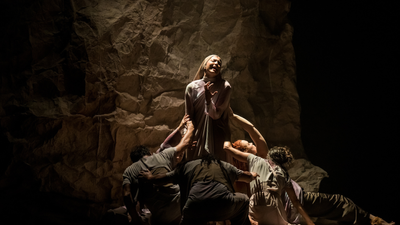In a field
I am the absence
of field.
This is
always the case.
Wherever I am
I am what is missing.
When I walk
I part the air
and always
the air moves in
to fill the spaces
where my body’s been.
We all have reasons
for moving.
I move
to keep things whole.
Keeping Things Whole, Mark Strand
As a young first-generation migrant, I sometimes felt fettered by my over-dutiful nature and fatigued by my tendency to hyper-empathise. Durga Chew-Bose, in her essay “How I Learned to Stop Erasing Myself”, described herself as “first-generation and in turn, proficient at splintering who I am in order to accommodate everyone else’s environment”. When asked about my aspirations, I gave brief, diplomatic answers that adults were happy to hear. I didn’t want to disappoint my family. My grades in school suggested I was a success story in Singapore’s “meritocratic” education system. But I had no idea who I actually wanted to be, what I really wanted to do. Choice feminism suggested I could, and should, do anything I dreamed of. The model minority narrative reminded me of everything I shouldn’t say or do.
Amidst such teenage torment, I yearned for freedom, what I imagined it must feel like to be beholden to no one, to nothing. I fancied Strand’s poem for its sense of possibility and agency: the repeated I ams, the active I walk, I part, I move. It suggested a conscious choice to shed my obligations to a community that was supposedly mine, that existing as a solitary being might be liberating. To follow my bliss, to operate from pure instinct and desire, would keep me intact and whole. I wouldn’t have to sacrifice myself for others. And when I was gone—when I’d moved on—it would be like I’d never been there at all.
In the same essay, Chew-Bose writes, “To be first-generation means acquiescing to a lasting state of restlessness. It’s as if you’ve inherited not just your family’s knotted DNA, but also the DNA acquired from their move, from veritable mileage, from the energy it took your parents to reestablish their lives.”
Movement becomes an act necessary for survival.
Strand’s poem returned to me when I watched two plays exploring displacement at the Singapore Fringe Festival earlier this year: the first, penned by an award-winning playwright and backed by a veteran local theatre company; the second, collectively devised by a group of transient workers based in Singapore who frequently rehearse together on weekends, during their precious time off from work.
“Eclipse”, a monologue by Haresh Sharma, is based on his own family’s experiences during the Partition of India and Pakistan in 1947, which displaced 15 million and left about a million dead. Sharma was first commissioned to write a short play on separation and union in nationhood in 2007, and this is the work’s second staging. Here, actor Shrey Bhargava slips effortlessly between the roles of Son, Father, and Grandfather—three generations of Sindhi men. “Eclipse” opens on the eve of Deepavali, the Festival of Lights. Son is thinking of scattering his recently deceased Father’s ashes in their ancestral home in Hyderabad (in present-day Pakistan’s Sindh province). From here, the play delves into how each of the three men’s lives has been impacted by the long shadow of Partition, and how they cope with dashed hopes, foiled plans, guilt, and grief.
Bhargava is directed by up-and-coming theatre artist A Yagnya in a visually austere production that keeps the focus on Sharma’s script. A big part of the creative process was the movement-based Viewpoints methodology, which prioritises the equal and non-hierarchical relationship of the performer’s body with elements such as space, time and text. “Eclipse” emphasises the use of space to convey transitions between identities, times, and locations. Its spare set comprises no more than a table, two chairs, an urn, and a large, unadorned white sheet of cloth. Accompanied by the periodic musical accompaniments and emphatic tabla bols of Hindustani vocalist Sveta Kilpady, we sit with Son, bearing witness as he processes his pain.

Where “Eclipse” is sparse in its execution, “The Troupe” by Birds Migrant Theatre is a cacophony of characters, changes, chaos. It’s a feat that the ensemble cast, some double-hatting as writers and actors, pulls off with impressive dexterity. There are several layers to this play-within-a-play. In the larger fictional world, a troupe of five actors—three refugees, and two locals—rehearses for a performance. Here, we see them workshopping scenes and debating how characters should be portrayed, while shading in the nuances of each (fictional) actor’s personal migratory histories. What they lack in resources, they make up for with a diverse range of vignettes across methods and media, languages and moods—the smaller fictional worlds they summon to life.
One moment, they’re beleaguered, wide-eyed refugees huddled together in a boat on the open sea, at the mercy of a callous boatman who withholds food and water, struggling to keep each other alive. The next, they’re maneuvering puppets and lights to depict a female refugee’s journey, gently abstracting the sexual violence and humiliation the character endures. And then they’re playing xenophobic anti-refugee locals, from a comical uncle lamenting their presence in his backyard as he searches for his lost goat, to zealous protestors physically blocking boats full of refugees from coming ashore. Occasionally, a makeshift screen lights up with photographs showing the hardships of war and forced migration, or to deliver fervent appeals from Ciecie (Wiwi Tri), a migrant domestic worker in Singapore who advocates for refugees via social media.
“The Troupe” doesn’t try to hide its effortful construction: even before the play begins, we see the actors setting the stage with the clever use of everyday materials—cloth knotted to poles to form a screen, benches positioned to indicate a raft. Given the volatile circumstances of both the refugee characters and the refugee troupe members portraying them, frequent rearranging and reorienting is necessary, even inevitable, for their survival. Everything and everyone must prove useful, or risk being pushed off the metaphorical (or literal) boat. When it comes to sink or swim, everything has more potential than its intended use; nothing is more sacred than staying alive.
Take the use of cloth, for example. In “Eclipse”, it’s imbued with an almost sacramental symbolism. Among other uses, it is draped over Son’s shoulders in a gesture of maternal love and care, then later evoking the covering of a dead body. In “The Troupe”, cloth serves far more functional purposes: it’s folded into a sanitary pad, torn to strips to stanch a gaping wound. What was representative of maternal love and warmth in “Eclipse” is also, here, corruptible and disposable. The bathrobe of a lecherous politician. The niqab that could not protect a woman from sexual violence.
In between these vignettes, the play zooms out and we witness the troupe members negotiating their craft amidst the uncertainties and competing priorities of their own precarious lives. Heng Jia Min, writing for Critics Circle Blog, foregrounds the troupe’s focus on the “caricatures of refugee, politician, boatman, aid worker, media, activist, etc.” But what keeps these scenarios from feeling tokenistic are their conscious and repeated efforts to not depict refugees as passive, pious, or picture-perfect martyrs. Despite less-than-favourable circumstances, they still squabble with their siblings, question their faith, and indulge in blossoming romances while seemingly more urgent matters are at stake.
Disruption is another key theme of the Fringe Festival, and the word is prominently displayed on the covers of the programme booklets for “Eclipse” and “The Troupe”. In both plays, the shock of loss begets a necessarily painful disruption.
In “Eclipse”, the untimely death of Son’s mother marks the start of a seven-year period of personal darkness. “Everything is mother. Mother is main part of the house, the heart,” Grandfather proclaims. “Father is busy with work. It is Mother who raise them and love them and teach them respect.” A reticent Father reproduces this patriarchal attitude with Son, at the expense of the familial intimacy between them. But Mother’s death also marks a watershed moment: when Son and Father slowly fumble their way towards building a genuine relationship.
These disruptions to the conventional nuclear family do eventually liberate these generations of men from the entrenched scripts of heteronormative social contracts and stigmas. The Grandfather’s second family in Japan is portrayed with sympathy, as one brought into existence by happenstance and filled with genuine happiness. The dissolution of the Son’s marriage (to a woman) leads to another relationship (with a man), whom he embraces as his “true love”. These stories aren’t without pain. But they pave the way for the possibility of living more authentically, and contentedly.
It’s harder to conceive of loss paving the way for a positive “disruption” in “The Troupe”, mainly because of the limited choice and agency in the circumstances that lead the troupe members to where they find themselves. These fictional artist-refugees are less theatre professionals, more passionate individuals for whom this role is both reprieve and responsibility, a way to make the most of their present while reckoning with the weight of their painful pasts and uncertain futures.

Perhaps that’s why collective decision-making within the troupe bears so much weight. In what I felt was the emotional climax of the play, we see the troupe members test out a new scene: they’re figuring out how a politician should be depicted. Shahrin (Zilani), a spirited young man who fled his home country after his involvement in resistance movements there, opts for an unabashedly unflattering portrayal. First, he plays the politician as an opportunistic demagogue with no qualms exiling refugees to an isolated offshore island. Then, he throws on a bathrobe, leaving it to hang open provocatively, as he plies an undergraduate with alcohol and sleazy terms of endearment (“honey”, “sweetie”), getting handsy with her while trying to garner her support for his political agenda.
This doesn’t sit well with fellow troupe member Sophia (Farah Hajan), a local university student bearing the hopes and expectations of her family. She fears the repercussions that may befall them for being too outspoken or critical. Shahrin counters: governments should be accountable to the people, who should not fear holding power to account. This back and forth is interrupted when Nila (Rina), one of the more introverted troupe members, intervenes. She insists that the politician should, in fact, be portrayed as an even more threatening aggressor, and proceeds to demonstrate how. Nila pushes and grasps at her fellow actress, going way farther than Shahrin, who’d stopped short of explicit force, and relied more heavily on exaggerated comic effect. The troupe, and the audience, fall silent. The specificity of Nila’s gestures strongly suggest that she is invoking her personal experience of sexual assault.
Just as not all migrants are not equally empowered, neither are all citizens or residents of a country. Artists do not exist, create nor perform in a vacuum, but are influenced and informed by their own experiences, challenges and marginalisations.
The two plays reminded me of the powerful documentary “Al Awda” by Singaporean filmmaker Jason Soo, which premiered at the Singapore International Film Festival last December. In 2018, 22 activists from 15 countries—including Dr Ang Swee Chai—set sail to challenge Israel’s blockade of Gaza and deliver aid to besieged Palestinians. Soo profiles these activists and documents daily life onboard the ship from which the film takes its name. Anticipating a potentially violent confrontation with Israeli forces upon arrival, the group’s leadership repeatedly emphasise the prerogative of any individual on board to terminate their resistance at any time—and, significantly, that this choice be respected by their peers. This decision-making approach takes into account the differing realities and risk capacities of each activist: their physical health, their obligations to family back home, their differing access to swift diplomatic support based on their nationalities.
In “Al Awda”, as in “The Troupe”, collective decision-making under pressure was, in fact, necessary for as safe and successful an execution of their project as possible. I deeply appreciated how “The Troupe” pulled the curtains back to reveal these conditions of art-making to the audience. Because “The Troupe” was revelatory in this way, it pushed me to reconsider the more individual and familial decision-making processes of “Eclipse”, which I’d watched the day before. In this debate with myself, I confess that some of what I am about to say might sound unkind.
Haven’t I seen this before? I thought.
Yes, but only because you’re the child of South Asian immigrants to Singapore, I reminded myself, albeit without the psychic weight of Partition. From Hanif Kureishi to Jhumpa Lahiri, I’d deliberately sought out similar narratives in books and films since I was a teen.
So, if we’re in a position of relative privilege…How long are we allowed to mourn the weight of our inherited baggage—before this becomes indulgent?
I returned to the intergenerational inheritances of “Eclipse”. At least Son…has a home? Has a Father who loves him, in his own taciturn way? Has the freedom to love who he chooses?
What is the “bigger picture”?
Well, there’s always a “bigger picture”…even the disenfranchised members of “The Troupe” acknowledge it. Near the end of the play, the projector comes back to life with a slideshow of photos from conflict zones. At first glance, some of these images conjure the everyday and the pastoral, like an aerial view of people walking through a field. But then we zoom out, and it becomes apparent that they aren’t taking a stroll, but are probably fleeing.
We are all chronic consumers of these images. Susan Sontag, in her 2003 text “Regarding the Pain of Others”, writes about being “a spectator of calamities” in the contemporary age, from our vantage points of relative privilege and safety. Just days ago, scrolling through my Instagram feed, I’d seen a photo with a heartwarming caption: children returning to school in Gaza after the January 19th ceasefire. This hopeful detail was marred by the harsh reality that all three boys pictured—their backs to the camera—were leaning on crutches. Each had lost part of a leg.
If “The Troupe” offers us that “bigger picture” in the way it toggles between its metafictional characters and stories, then “Eclipse” compels us to stay with the “smaller picture”, the granular decision-making processes that form but one strand of the larger fabric of forced migration. It’s an understated, introspective story at the scale of the family that leaves the audience to reflect on these macro and micro parallels for themselves. We understand something we’ve never lived through in the way these characters seek connection across intergenerational relationships, and deal with universal emotions of grief, guilt and loss.
In “Eclipse”, Father declares: “I will have a son and I will teach him everything. I will give him everything. He will not have problems of war. His neighbours will not kill him. His country will be his home and his home his country. No fighting, no torture, no corruption, no nothing. He will be happy. My son will be happy.”
And Son does achieve some degree of happiness. Forced migration due to Partition did indeed pave the way for Son’s country to be his home, and his home his country, over the course of three generations. Singapore doesn’t (yet) face problems of war nor neighbourly killings. Yet, there are some limitations Son cannot escape. Here, minorities still disproportionately face economic lack, sociocultural prejudices such as colourism, as well as reductive racial caricature. Structural inequalities still persist, and I imagine that queer people’s unequal access to public housing would also likely continue to plague Son’s life. It was less than a decade ago that Bhargava, the star of “Eclipse”, was himself the recipient of ugly racism. He was asked to play up a stereotypical Indian accent in an audition, then reported to the police when he spoke up about it. In both fiction and in real life, not all migrants are equal; neither are all citizens.
Loss and grief may provide us with shared points of emotional reference. But even these big equalisers are bound up with the inequities of privilege. Perhaps the greatest of these is the passport to mourn without having to move. In “Eclipse”, loss and grief eventually lead Son to return to Hyderabad, home of his Father and Grandfather. While the locals are overwhelmingly warm, he quickly realises that their overbearing hospitality is not for him. Son gets to decide, and define, that “home” is a final whiskey with his dad, and the possibility of a life with his lover in Singapore.
“The Troupe”, too, ends with a departure. But it’s an involuntary one that the group doesn’t have the space nor time to mourn. As the troupe of actors finally opens their show, one of them is forced to flee for his safety. One man gets to return to the home of his choosing; another can’t stay for the opening of the play he’s worked so hard to be a part of.
How might we overcome displacement? The Fringe Festival team, in their foreword on the festival’s theme, cite revolutionary educator Paulo Freire’s declaration that “a total denouncement of fatalism is necessary.” Yet both “Eclipse” and “The Troupe” seem to embrace the hand of fate. The former even opens with Son citing his Father’s fatalist words:
“My father used to say, there are too many people in the world. Some have to die. It’s in the books. It’s been happening, he says, for thousands of years. […]
My father used to say, when it is time, everything will come together. There is a reason for violence, a reason for suffering.”
One imagines that the refugee characters of “The Troupe” may resent Father’s seemingly glib remarks. But the play does open with the cast trying to outdo each other with morbid jokes about death.
In the months that followed October 7th 2023, I obsessively followed social media updates from journalists on the ground in Gaza. Plestia Alaqad, Motaz Azaiza, Hamza al-Dahdouh, Bisan Owda…their names, their faces, their voices, have become as familiar to me as those of my friends’.
As each journalist was either killed, or left for safer shores, Bisan’s dispatches continued, from different locations. She chose to stay, but she also moved to survive. Her opening lines became a refrain: “I’m still alive.” Declarative, like Strand’s poem.
I don’t have a ready solution to the differentiated privileges afforded to each of us, but I can bear witness to and name the injustice of it. I don’t have an answer to the question of how to cope with displacement, either, because the options available to each person vary so greatly.
Maybe acknowledging this reality isn’t fatalism, but is instead its very opposite. Perhaps displacement is not so much a condition to be overcome, as one to persist with, live through. And whether we’re dealing with an individual or a collective grief, we’re never alone. We can always seek solace from our communities—just as we have a responsibility of care to those sustaining us. Some are able to choose stillness, to rest in it. Others must move. To keep whole.
Aditi Shivaramakrishnan works as an editor, writer and speech-to-text interpreter in Singapore. Her writing has been published in the Asian Film Archive’s Despatches, ArtsEquator, Esplanade Offstage, gal-dem, Jom, Portside Review, and elsewhere.
Letters in response to this piece can be sent to arts@jom.media. All will be considered for publication on our “Letters to the editor” page.
If you enjoy Jom’s work, do get a paid subscription today to support independent journalism in Singapore.






